

Camera. The Internet map. Regulating the web: Does the internet need its own bill of rights? Does the internet need its own bill of rights?
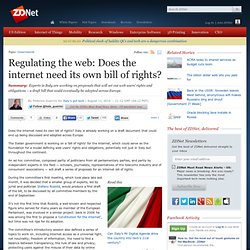
Italy is already working on a draft document that could end up being discussed and adopted across Europe. The Italian government is working on a 'bill of rights' for the internet, which could serve as the foundation for a model defining web users' rights and obligations, potentially not just in Italy but throughout the continent. An ad hoc committee, composed partly of politicians from all parliamentary parties, and partly by independent experts in the field — scholars, journalists, representatives of the telecoms industry and of consumers' associations — will draft a series of proposals for an internet bill of rights. During the committee's first meeting, which took place late last month, it was decided that a smaller group of experts, led by jurist and politician Stefano Rodotà, would produce a first draft of the bill, to be discussed by all committee members by the end of September.
COMMUNIQUES DE PRESSE Midday Express. Refugee Crisis: European Commission awards €35 million to Sweden, €8 million to Finland and €5 million to Belgium in emergency funding The European Commission has awarded €35 million to Sweden, €8 million to Finland and €5 million to Belgium in emergency funding to support these countries in managing the high influx of asylum seekers.
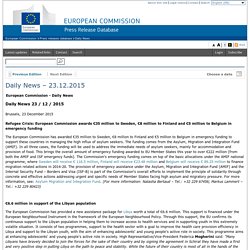
The funding comes from the Asylum, Migration and Integration Fund (AMIF). In all three cases, the funding will be used to address the immediate needs of asylum seekers, mainly for accommodation and provision of food. This brings the overall amount of emergency funding awarded to EU Member States this year to over €222 million (from both the AMIF and ISF emergency funds).
The Commission's emergency funding comes on top of the basic allocations under the AMIF national programme, where Sweden will receive € 118.5 million, Finland will receive €23.48 million and Belgium will receive € 89.25 million to finance migration related actions in 2014-20. Viewing Where the Internet Goes. The New York Times - Breaking News, World News & Multimedia. The backbone for European science gets stronger: 100Gbps internet for individual researchers. European Commission Press release Brussels, 31 July 2013 The backbone for European science gets stronger: 100Gbps internet for individual researchers GÉANT, the superfast pan-European research network that helped discover the Higgs Boson, announced today that it could reach speeds up to 2Tbps (terabits per second) thanks to a major network upgrade.
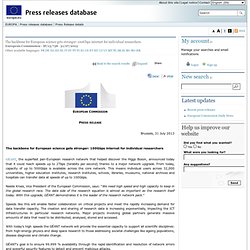
From today, capacity of up to 500Gbps is available across the core network. Neelie Kroes, Vice President of the European Commission, says: “We need high speed and high capacity to keep in the global research race. Speeds like this will enable faster collaboration on critical projects and meet the rapidly increasing demand for data transfer capacity. With today's high speeds the GÉANT network will provide the essential capacity to support all scientific disciplines: from high-energy physics and deep space research to those addressing societal challenges like ageing populations, disease diagnosis and climate change.
Background Useful links. Consumers - Market Monitoring. Study on Internet Services Provision market The market for internet access and provision had the highest percentage of consumers who experienced problems, across the 50 markets surveyed in 2010.
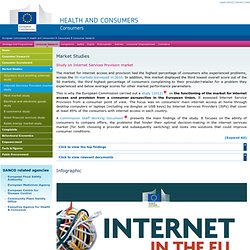
In addition, this market displayed the third lowest overall score out of the 50 markets, the third highest percentage of consumers complaining to their provider/retailer for a problem they experienced and below average scores for other market performance parameters. This is why the European Commission carried out a study (2012) Reports on eLAC outcomes from Montevideo IV Ministerial Conference. By MK for APCNews MONTREAL, 10 April 2013 eLAC Ministerial Conference: Left to right: Mario Campolargo, Director of DG CONNECT.E, European Commission; Alicia Bárcena, ECLAC Executive Secretary; Luis Almagro, Minister of Foreign Affairs of Uruguay, and José Clastronik, Chair of the Presiding Officers of the eLAC2015 follow-up mechanism.
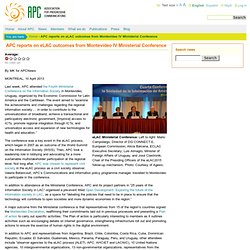
The New York Times - Breaking News, World News & Multimedia. Internet on TV, TV on Internet: Commission seeks views on rapidly converging audiovisual world. European Commission Press release Brussels, 24 April 2013 Internet on TV, TV on Internet: Commission seeks views on rapidly converging audiovisual world Millions of Europeans catch up with their favourite TV series on a smartphone on the way to work, watch online content on their living room TV, or put their own user-generated content online.
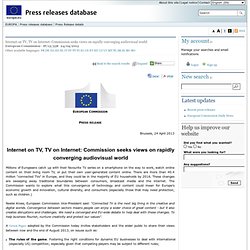
There are more than 40.4 million "connected TVs" in Europe, and they could be in the majority of EU households by 2016. Neelie Kroes, European Commission Vice-President said: "Connected TV is the next big thing in the creative and digital worlds. Digital Agenda for Europe. Network of Excellence in InterNet Science (EINS) EC Audiovisual Service - EbS. PRESS RELEASES - Press Release - Speech - Driving digital growth. European Commission Neelie Kroes Vice-President of the European Commission responsible for the Digital Agenda Driving digital growth Press conference on new digital priorities for 2013-2014/ Brussels 18 December 2012 Good morning everybody We conducted a comprehensive review of our Digital Agenda for Europe and it is going well.
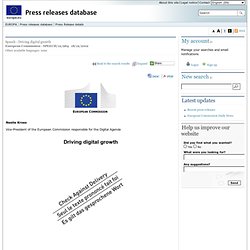
But that is not enough. Yesterday doesn't count in the digital world - complacency is a killer.